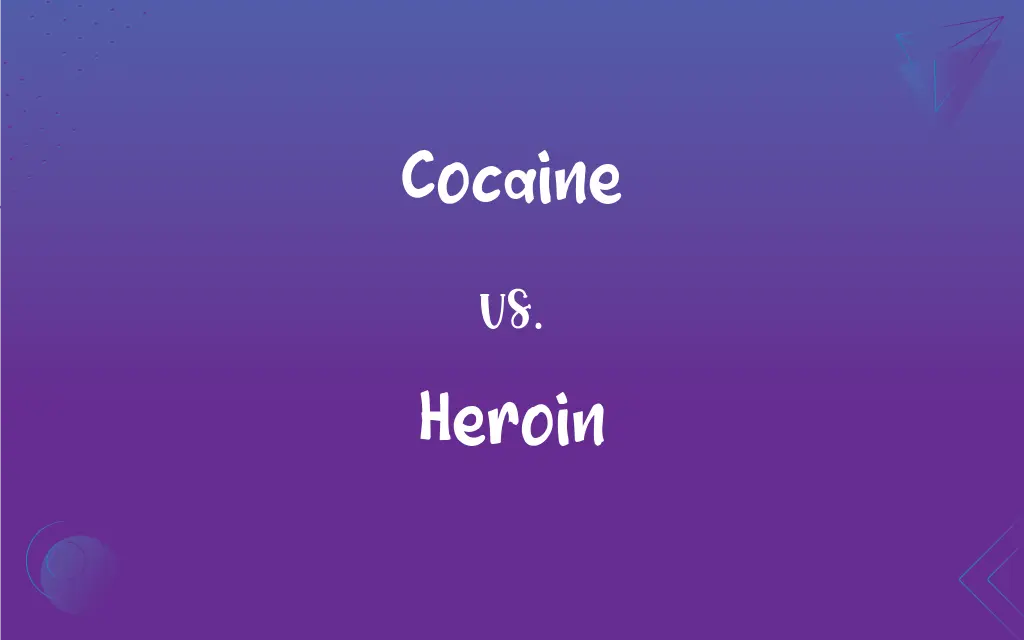Cocaine vs. Heroin: What's the Difference?
Edited by Aimie Carlson || By Harlon Moss || Updated on October 5, 2023
Cocaine is a powerful stimulant drug, while heroin is a highly addictive opioid. Both are illegal and can cause serious harm or death.

Key Differences
Cocaine, derived from the coca plant, acts as a potent central nervous system stimulant, inducing feelings of heightened energy and euphoria. Heroin, on the other hand, is an opioid, originating from the opium poppy, and it’s notorious for inducing intense sensations of relaxation and euphoria. Both substances significantly impact the user’s brain and can lead to various adverse effects and dependence.
Cocaine often manifests as a white powder and is commonly snorted, though it can also be smoked or injected. Heroin, however, typically appears as a white or brown powder or as a black, sticky substance (black tar heroin) and can be injected, snorted, or smoked. Both drugs are known for their high potential for addiction and are linked with severe health issues.
Cocaine's effects are generally short-lived, prompting users to consume it more frequently to maintain the desired effects, thereby increasing the risk of overdose and addiction. In contrast, heroin’s effects last somewhat longer, but its profound impact on the respiratory system and potential for overdose, especially when used in conjunction with other substances, render it extremely dangerous.
The socioeconomic and public health impacts of cocaine and heroin usage are globally significant, with both drugs contributing to crises of addiction, crime, and health disparities. While cocaine is often associated with energetic and erratic behavior, heroin use is commonly linked with sedation and slowed bodily functions, illustrating the fundamental pharmacological distinctions between stimulants and opioids.
Finally, it’s pivotal to underscore the legality and ethical considerations associated with discussing cocaine and heroin. Both substances are illegal in most jurisdictions due to their high potential for abuse and harm. Dialogues and interventions concerning these drugs should prioritize public health, safety, and harm reduction approaches.
ADVERTISEMENT
Comparison Chart
Drug Class
Stimulant
Opioid
Derived From
Coca Plant
Opium Poppy
Common Form
White Powder
White/Brown Powder or Black Tar
Method of Use
Snorted, Smoked, Injected
Injected, Snorted, Smoked
Duration of Effects
Short-Term
Relatively Longer-Term
ADVERTISEMENT
Cocaine and Heroin Definitions
Cocaine
A potent stimulant drug derived from the coca plant.
He was arrested for possessing cocaine.
Heroin
A substance that significantly depresses the central nervous system.
Prolonged heroin use can lead to severe health complications.
Cocaine
A substance that interferes with the reuptake of neurotransmitters in the brain.
Research indicates that cocaine alters normal communication between neurons.
Heroin
An illegal opioid derived from morphine, known for causing profound euphoria.
Heroin overdoses have been increasing in several regions.
Cocaine
A substance notorious for its capacity to induce temporary feelings of euphoria and energy.
The individual exhibited intense agitation after consuming cocaine.
Heroin
A drug associated with severe physical dependence and withdrawal symptoms.
Heroin withdrawal can be incredibly painful and challenging.
Cocaine
A drug that exists in various forms, including crack cocaine, and can be consumed via various methods.
Crack cocaine, a variant, is often smoked, providing a rapid but fleeting high.
Heroin
A drug that is often injected, offering a rapid onset of its potent effects.
Injecting heroin poses additional risks, including the potential for infection.
Cocaine
A drug commonly associated with various health risks and social issues.
Cocaine trafficking has been a major issue for law enforcement.
Heroin
A substance commonly found both in powder form and as a sticky black material.
The police confiscated black tar heroin during the raid.
Cocaine
A colorless or white crystalline alkaloid, C17H21NO4, extracted from coca leaves, sometimes used in medicine as a local anesthetic especially for the eyes, nose, or throat and widely used as an illicit drug for its euphoric and stimulating effects.
Heroin
A white, odorless, bitter crystalline compound, C21H23NO5, that is derived from morphine and is a highly addictive illegal narcotic. Also called diacetylmorphine.
Cocaine
An addictive drug derived from coca (Erythroxylum) or prepared synthetically, used sometimes medicinally as a local anesthetic and, often illegally, as a stimulant.
Heroin
A powerful and addictive drug derived from opium producing intense euphoria. Classed as an illegal narcotic in most of the world.
Cocaine
(countable) Any derivative of cocaine.
Heroin
A morphine derivative, diacetyl morphine, used to relieve severe pain and as a sedative. It is highly addictive, and its use is strictly controlled in the U.S. by federal law. It is a popular strong narcotic drug of abuse, in part because it is more soluble than morphine. It is sometimes included as one of the components of Brompton's mixture, used to control pain in terminallly ill patients.
FAQs
Is cocaine addictive?
Yes, cocaine is highly addictive due to its impact on the reward pathway in the brain.
Are there treatments available for addiction to cocaine or heroin?
Yes, various treatments, including medication-assisted treatment and behavioral therapies, are available for addiction to both drugs.
What is cocaine?
Cocaine is a powerful, illegal stimulant drug derived from the coca plant.
How is cocaine used?
Cocaine is typically snorted, but it can also be smoked or injected.
What are the effects of cocaine?
Cocaine can cause short-term euphoria, energy, and talkativeness but also potentially dangerous heart issues and risk of overdose.
Is heroin addictive?
Yes, heroin is one of the most addictive substances known, often causing physical dependence.
What impact do cocaine and heroin have on society?
Both drugs contribute to societal issues like crime, economic burden, and public health crises.
How can communities combat issues related to cocaine and heroin?
Community approaches might include preventative education, accessible treatment services, and harm reduction strategies like naloxone distribution.
What are the health risks of using cocaine?
Health risks include heart attack, stroke, seizure, and addiction, among others.
What is heroin?
Heroin is an illegal opioid drug synthesized from morphine, providing intense euphoria and relaxation.
What are the effects of heroin?
Heroin leads to drowsiness, euphoria, and impaired respiratory function, with a high risk of overdose.
Can cocaine and heroin be used together?
They are sometimes used together (a "speedball"), which is extremely dangerous and significantly increases overdose risk.
How is heroin used?
Heroin can be injected, smoked, or snorted.
What happens during a heroin overdose?
An overdose can cause slow or stopped breathing, coma, and death if not treated promptly.
Which drug is more dangerous, cocaine or heroin?
Both are extremely dangerous, causing numerous health issues, addiction, and potential for fatal overdose.
How are cocaine and heroin trafficked?
Both drugs are often trafficked internationally, involving complex and illicit networks.
What are the legal consequences of being caught with cocaine or heroin?
Legal consequences vary by jurisdiction but typically include fines, imprisonment, and mandatory drug education or rehabilitation.
How do cocaine and heroin impact mental health?
Both drugs can exacerbate or contribute to mental health issues, including depression and anxiety.
How does the potency of cocaine compare to heroin?
cocaine acts as a stimulant, while heroin is a depressant.
Why are cocaine and heroin illegal?
Due to their high potential for abuse, addiction, and significant health risks, both are illegal in many countries.
About Author
Written by
Harlon MossHarlon is a seasoned quality moderator and accomplished content writer for Difference Wiki. An alumnus of the prestigious University of California, he earned his degree in Computer Science. Leveraging his academic background, Harlon brings a meticulous and informed perspective to his work, ensuring content accuracy and excellence.
Edited by
Aimie CarlsonAimie Carlson, holding a master's degree in English literature, is a fervent English language enthusiast. She lends her writing talents to Difference Wiki, a prominent website that specializes in comparisons, offering readers insightful analyses that both captivate and inform.































































